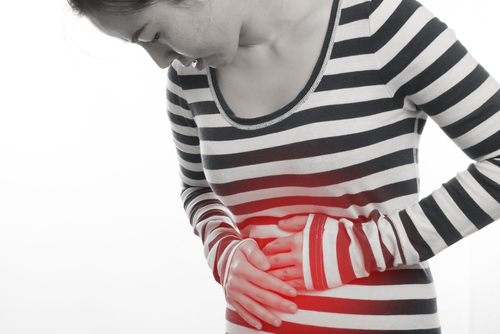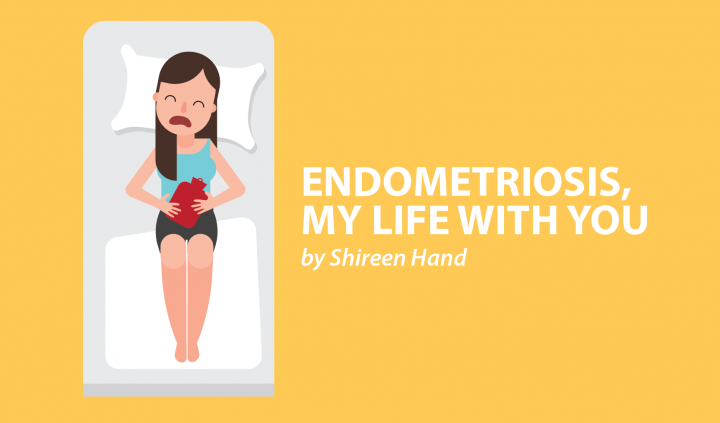One of the main things non-sufferers tend to misunderstand about endometriosis is that it isn’t just a “bad period.” Many of us have spoken out about the pain we are in due to endometriosis, only to receive a response such as, “Oh yeah, I get really bad periods, too! Have you tried taking Paracetamol for it?” It can become very frustrating when you are trying to help people understand what life is like with this chronic illness.
So, is endometriosis a “bad period”? Let’s have a look at some facts.
What is a period?
Menstruation, or a period, is defined by Planned Parenthood as “when blood and tissue from your uterus come out of your vagina.” Each month, the lining of the uterus (endometrium) thickens in preparation for a fertilized egg. With a fertilized egg, a baby will develop in the uterus. Without fertilization, the lining gets released from the body through the vagina as a period.
Menstruation usually happens once a month, in females between the ages of 12 to 52, on average. In this time, you will have around 480 periods, or fewer if you have any pregnancies.
Periods themselves do not hurt. However, some women can have cramps and other symptoms that can make it uncomfortable. This is due to the hormones released during a period that cause the uterus to contract, enabling it to shed its lining.
What is endometriosis?
Endometriosis is a painful, chronic, gynecological disease. It occurs when tissue similar to that which lines the uterus is found growing outside of the womb, usually in the pelvis (although it can be found elsewhere in the body), and develops into growths or lesions.
Endometriosis cells react in the same way to a period, except these cells are located outside of the womb. During a woman’s monthly cycle, hormones stimulate the endometriosis. This causes it to grow, then break down and bleed. This internal bleeding, unlike a period, has no way of leaving the body. This results in a buildup of inflammation and scarring.
The inflammation can cause various organs to become matted together in a web of scar tissue (adhesions). These can cause chronic pain and may interfere with the normal function of organs, such as the bowel, bladder, or ovaries.
Endometrial tissue can also form cysts on the ovaries. Some cysts, known as ‘”functional” cysts, may not cause any problems. Another form of cysts, known as endometrioma, or “chocolate cysts” (so-called due to their appearance), can cause intense pain. If these types of cysts rupture, the contents of the cyst can spill out into the pelvic cavity, leading to more adhesions.
What are the key differences between periods and endometriosis?
- Periods are a natural process that all women will experience as their bodies physically mature. Endometriosis is a gynecological disease affecting an estimated one in 10 women.
- Periods typically last from three to 8 days and are usually regular. Most women will only lose between five to 12 teaspoons of blood. With endometriosis, periods can be irregular, last far longer, and be extremely heavy. Some women bleed between periods or constantly.
- Periods can cause some pain, but this can usually be relieved with painkillers, a heat pad, or light exercise. Women with endometriosis describe their pain as persistent. It usually correlates with the menstrual cycle, but pain may also be experienced at other times during the cycle including during or after sex, internal examinations, ovulation, and bladder or bowel movements.
- Once the period finishes, discomfort leaves. Endometriosis is described as a chronic illness as it lasts a long time. It can cause problems every day of your reproductive life and continue to do so after menopause.
- Period pain shouldn’t interfere with your daily life. Endometriosis pain can be so severe that women can feel nauseous and faint. For some, the pain can be debilitating, making even the simplest of tasks near impossible.
- Period pain is usually limited to the lower abdomen, hips, and back. Since endometriosis can occur in any area of the body — from the vulva to the brain — pain will be felt in a more widespread area.
- Periods themselves do not cause complications. Endometriosis can cause infertility, bowel/ureteral obstruction, peritonitis from bowel perforation, an increased risk of cancer (particularly ovarian cancer) and an increased risk of miscarriage or premature birth.
Endometriosis is an all-encompassing disease that can affect every part of your life. It is so much more than just a “bad period.”
You can follow more of my journey over at www.emlwy.com.
***
Note: Endometriosis News is strictly a news and information website about the disease. It does not provide medical advice, diagnosis, or treatment. This content is not intended to be a substitute for professional medical advice, diagnosis, or treatment. Always seek the advice of your physician or other qualified health provider with any questions you may have regarding a medical condition. Never disregard professional medical advice or delay in seeking it because of something you have read on this website. The opinions expressed in this column are not those of Endometriosis News or its parent company, BioNews Services, and are intended to spark discussion about issues pertaining to endometriosis.


